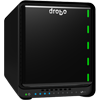My Drobo Saved Me From Barracudas
 So, in early January, my Drobo started rebooting again. Everything is now resolved, and all in all I think the Drobo was not only not the problem, but ended up going a little above and beyond in helping keep my data safe.
So, in early January, my Drobo started rebooting again. Everything is now resolved, and all in all I think the Drobo was not only not the problem, but ended up going a little above and beyond in helping keep my data safe.
When I purchased the Drobo 5D, I got a good deal on Seagate Barracuda 3TB drives (ST3000DM001), and I'd had a lot of Barracudas in the past, so despite the fact that these aren't specifically designed for NAS/DAS setups, I put four of these in. This past summer, one of these drives failed and another got out of sync, possibly due to a power failure. This latest reboot cycle was caused by one more Barracuda having totally failed, and another partially failed. I cloned the latter (onto a new ST3000DM001, for easy cloning) and replaced the former (with a 4TB NAS drive).
While I was going through this process, Backblaze released another round of their drive reliability data, showing among other things that Backblaze has seen a 43.1% yearly failure rate for the Seagate 3TB Barracuda that I have bought six of (four originally, two replacements). Great! I seem to have selected, by accident, to buy six hard drives from a model that is incredibly prone to self-destruction. That 43% failure rate is just a little tiny bit higher than the 0.6% failure rate for the 3TB Deskstar 5K3000.
Having to clone a drive myself is annoying, but to be fair, I had two failing disks and the Drobo was configured to protect me from one failing disk, so at this point I'm just happy that I didn't have to do a complete restore from online backup. Once the system was back in working order with four disks again, I turned dual disk redundancy on, which should help to protect me from future disaster.
I'm still a little frustrated with the black box nature of my Drobo — I'm used to having access to more information than I get from either Drobo or the Drobo support team, like:
- Why is my Drobo rebooting?
- Why did my Drobo decide a drive has failed?
- Can it not read data?
- Is it seeing a lot of bad blocks?
- Is it getting SMART data implying impending failure?
- Is the drive dead forever, suspect, or basically fine but needs to be redone?
- Was it a permanent hardware failure?
- Just some kind of unrecoverable filesystem corruption?
These kinds of answers are hard to get. I recognize that not everyone would want these kinds of answers, but I do. I also still find the Drobo software slow and a bit buggy, which is annoying.
Still, all's well that ends well, and in this case I still have my data and Drobo, both the company and the product, helped to keep me in good working order. I have to give both props and it has helped me feel better about having a Drobo, which is great.
Conclusions and thoughts?
- RAID is not a backup (I know, I know)
- Seagate 3TB Barracuda drives seem to be a disaster in the failure department
- Dual-disk redundancy is your friend, even though that reduces the capacity of the Drobo somewhat.
- I'm going to have to seriously consider replacing these Barracudas one by one before they fail en masse an do even more damage.
- Having a diverse HDD portfolio might allow me to mitigate risk somewhat.
- Multi-disk units seem inevitable, but I still feel like they're not nearly mature enough for the general public.
- I'm curious to compare a Synology NAS over the long haul to see how I feel about that as an option, even though DAS feels like the right fit for my use.